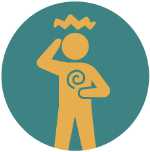Calming Herbal Formulas
for Everyday Anxiety
In Traditional Chinese Medicine (TCM), anxiety is not regarded as an isolated mental health issue but as a symptom of disharmony among the organ systems. Emotional unrest arises when the Heart cannot securely house the Shen (spirit), or when the smooth flow of Qi is disrupted, particularly in the Liver. In chronic cases, Kidney or Spleen deficiencies may also be involved. Herbal medicine in TCM does not suppress anxiety in the way that sedatives do; instead, formulas aim to address the constitutional imbalances contributing to emotional distress, restoring calm through regulation and nourishment.
Matching Patterns with Formulas
Note: These patterns are simplified for general educational purposes. Proper diagnosis by a licensed practitioner is essential.
Heart and Kidney Yin Deficiency
Symptoms: Anxiety with insomnia, night sweats, palpitations, dry mouth, fatigue.
Recommended Formula: Tian Wang Bu Xin Dan
Liver Qi Stagnation
Symptoms: Mood swings, irritability, tight chest, digestive upset, PMS.
Recommended Formula: Chai Hu Shu Gan San
Heart and Gallbladder Qi Deficiency
Symptoms: Timidity, indecisiveness, frequent sighing, anxiety worsened by pressure.
Recommended Formula: Ding Zhi Wan
Zang Zao (Organ Agitation)
Symptoms: Restlessness, frequent crying, emotional sensitivity, postpartum or menopausal symptoms.
Recommended Formula: Gan Mai Da Zao Tang
One of the most well-studied formulas for chronic anxiety with sleep disturbance is Tian Wang Bu Xin Dan (Heavenly Emperor’s Heart Tonic). This formula is traditionally used when there is a deficiency of Heart Yin and Kidney Yin, leading to insomnia, palpitations, irritability, and forgetfulness. The ingredients include Shēng Dì Huáng (Rehmannia root) to nourish yin, Suān Zǎo Rén (Ziziphus seed) to calm the spirit, and Yuǎn Zhì (Polygala root) to clear phlegm and open the Heart orifices. Though mild in sedative effect, its value lies in building long-term resilience of the Heart and Kidney systems.
For individuals whose anxiety is closely related to constrained emotions—such as frustration, sighing, or a sensation of a lump in the throat—Chai Hu Shu Gan San (Bupleurum Powder to Spread the Liver) is often prescribed. This formula emphasizes the movement of Liver qi and addresses stagnation that disrupts emotional stability. Its primary ingredient, Chái Hú (Bupleurum root), is paired with Zhǐ Ké (bitter orange) and Bái Sháo (white peony root) to soothe and regulate both the Liver and Spleen. It is especially useful for stress-induced anxiety accompanied by digestive symptoms or premenstrual emotional shifts.
In cases where anxiety presents with digestive weakness, fatigue, and mental overexertion, Ding Zhi Wan (Settle the Emotions Pill) may be selected. This lesser-known yet effective formula targets Heart and Gallbladder qi deficiency. Its ingredients—Ren Shen (ginseng), Fu Ling (poria), Yuan Zhi, and Shi Chang Pu (acorus)—tonify qi, transform phlegm, and open the sensory orifices. It is particularly suited for those who feel indecisive, timid, or easily startled—signs traditionally linked to Gallbladder weakness in TCM.
For more acute episodes of anxiety, such as sudden panic or emotional agitation, Gan Mai Da Zao Tang (Licorice, Wheat, and Jujube Decoction) offers a gentle and safe approach. With only three ingredients—Gān Cǎo (licorice root), Fú Xiǎo Mài (light wheat), and Dà Zǎo (jujube)—this formula is rooted in classical texts and is indicated for what the ancients called “Zang Zao,” a condition marked by restlessness and a desire to cry without reason. It is often used in modern practice for postpartum mood disorders or anxiety in sensitive individuals.
Unlike single sedative herbs, these formulas are carefully balanced to prevent side effects and to match the patient's pattern. Diagnosis is essential; formulas must be selected and modified according to individual presentation. Used appropriately, these herbal combinations can help alleviate mild to moderate anxiety while supporting the body's deeper systems of resilience.
Vocabulary Guide
- Shen (神): Spirit or mind, housed in the Heart
- Qi (气): Vital energy flowing through the body
- Tian Wang Bu Xin Dan (天王补心丹): Heart and Kidney yin tonic, used for chronic anxiety with sleep disturbance
- Chai Hu Shu Gan San (柴胡疏肝散): Liver qi-regulating formula for stress-related anxiety
- Ding Zhi Wan (定志丸): Formula that calms the spirit and supports the Gallbladder and Heart
- Gan Mai Da Zao Tang (甘麦大枣汤): Gentle formula for emotional agitation or postpartum anxiety
- Suān Zǎo Rén (酸枣仁): Ziziphus seed, commonly used to calm the spirit
- Chái Hú (柴胡): Bupleurum root, used to move Liver qi
- Yuǎn Zhì (远志): Polygala root, used to calm the spirit and open the orifices
- Shi Chang Pu (石菖蒲): Acorus, clears phlegm and benefits the mind



